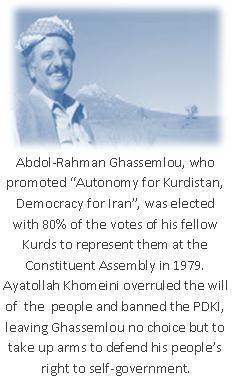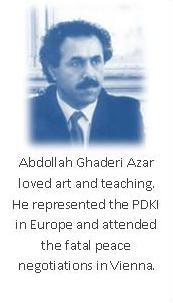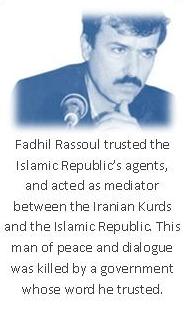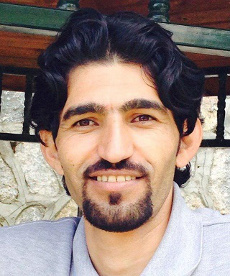25 Years after the Vienna Assassinations, Austria Still Owes Justice to the Victims
 “No country wants to prosecute a terrorist case. It’s a threat to your government, your stability, to your penal system. A convicted terrorist faces a life sentence, which means, in Austria, at least 15 years. That means that for 15 years you are at risk.”
“No country wants to prosecute a terrorist case. It’s a threat to your government, your stability, to your penal system. A convicted terrorist faces a life sentence, which means, in Austria, at least 15 years. That means that for 15 years you are at risk.”
A “top-level Vienna official” to Time Magazine, March 21, 1994
25 years ago, in July, a meeting took place between Abdol-Rahman Ghassemlou, Secretary General of the Democratic Party of Iranian Kurdistan (PDKI) and the Islamic Republic’s emissaries in an apartment in Vienna, Austria. The Kurdish leader had come in good will, to discuss Kurds’ grievances and to end the enmity that had opposed his party to the central government since 1979. The negotiations that had started the previous year ended abruptly in Vienna on July 13th. Ghassemlou’s arguments did not convince his interlocutors, and his good will was punished with bullets.
Party of Iranian Kurdistan (PDKI) and the Islamic Republic’s emissaries in an apartment in Vienna, Austria. The Kurdish leader had come in good will, to discuss Kurds’ grievances and to end the enmity that had opposed his party to the central government since 1979. The negotiations that had started the previous year ended abruptly in Vienna on July 13th. Ghassemlou’s arguments did not convince his interlocutors, and his good will was punished with bullets.
Austrian police found the bodies of the Kurdish delegation at the meeting location. Dr. Ghassemlou had been hit three times in his temple, throat, and forehead. Fadhil Rassoul, the Iraqi Kurd who had facilitated the meeting, had been shot three times in the head and twice in the neck. Abdollah Ghaderi Azar (Qaderi), PDKI’s representative in Europe, had been hit by 7 bullets in the back of his head and his waist, temple, throat, shoulder, and index finger of his right hand. A final shot to the head was delivered to all three victims. An audio recording of the meeting (made without the knowledge of the Iranian delegation) revealed a conversation on Kurdish demands, the sound of furniture being moved, and shots fired from guns using silencers.
Of the three Iranian government emissaries, one disappeared. Another showed up at the crime scene unharmed, and the third was injured with one bullet and no final shot. The Iranian government emissaries were Mohammad Jafari Sahraroudi (head of the Kurdish Affairs Section of the Iranian Ministry of Intelligence), Mostafa Ajoudi (the Iranian Governor of the Province of Kurdistan), and Amir Mansour Bozorgian (a.k.a. Ghaffoor Darjazi), member of the Islamic Revolutionary Guard Corp Special Forces.
 What happened next was a shock, not only to the devastated families of the victims, but to all Iranian dissidents who had taken refuge in Europe. The Austrian Police, after observing the crime scene and preliminary investigations, had little doubt about the Iranian emissaries’ involvement in the crime. Sahrarudi and Bozorgian were detained and interrogated by the police. One’s testimony belied the other’s, strengthening the investigators’ suspicion of their involvement in the crime. Despite the incriminating evidence, both were released to return to Iran. It was only on November 28, 1989, months after they had left Austria that arrest warrants were issued for Bozorgian, Sahraroudi, and Ajoudi.
What happened next was a shock, not only to the devastated families of the victims, but to all Iranian dissidents who had taken refuge in Europe. The Austrian Police, after observing the crime scene and preliminary investigations, had little doubt about the Iranian emissaries’ involvement in the crime. Sahrarudi and Bozorgian were detained and interrogated by the police. One’s testimony belied the other’s, strengthening the investigators’ suspicion of their involvement in the crime. Despite the incriminating evidence, both were released to return to Iran. It was only on November 28, 1989, months after they had left Austria that arrest warrants were issued for Bozorgian, Sahraroudi, and Ajoudi.
The slow pace of the investigation and the release of the main suspects prompted Dr. Ghassemlou’s widow to file a complaint against the Austrian government for denial of justice. The Austrian court dismissed the case without hearing the evidence. The court also ruled that Ms. Ghassemlou should pay the government legal fees.
The successful assassination in Vienna and the Austrian government’s decision not to prosecute the perpetrators could only encourage the Islamic Republic’s leadership. Sahraroudi was promoted and the Iranian leaders, reassured by the de facto impunity they benefited from, went on to implement their plan to eliminate all active and potential political opponents abroad. In the five years following the Vienna assassinations, five Iranian opposition members were killed in France, one in Switzerland, one in Italy, and Dr. Ghassemlou’s successor at the head of PDKI, along with three companions, were murdered in Berlin.
the Vienna assassinations, five Iranian opposition members were killed in France, one in Switzerland, one in Italy, and Dr. Ghassemlou’s successor at the head of PDKI, along with three companions, were murdered in Berlin.
On the 25th anniversary of the 1989 triple murder, Vienna hosted new negotiations, this time between Iran and the world powers. As in 1989, these negotiations carry, for many, the hope of ending decades of hostility, tensions, and isolation. Today, the tragic outcome of the hope-filled July 1989 negotiations and the no less tragic consequences of the impunity granted to those who ordered and carried out the killing are irrelevant to the international community.
It is no surprise then that, in October 2013, Iran’s leadership, confident in the impunity of its agents, allowed Mr. Sahraroudi, Chief of Staff to the head of Iran’s Parliament, to accompany Ali Larijani to the Inter-Parliamentary Union Conference in Geneva. Iran’s confidence was justified. Despite the international arrest warrant against him, Mr. Sahraroudi went back to Iran, untroubled.
On this 25th anniversary, Abdorrahman Boroumand Foundation pays homage to the memory of Abdol-Rahman Ghassemlou, Abdollah Qaderi Azar, and Fadhil Rassoul and supports the families’ quest for justice by documenting the assassination and ensuring that victims are remembered. ABF urges the Austrian government to acknowledge the victims’ rights and to take the necessary measures to bring the perpetrators of the Vienna assassination to justice.
 My Interrogator Said: You Are An Ass, And Asses Do Not Merit Human Rights
My Interrogator Said: You Are An Ass, And Asses Do Not Merit Human Rights